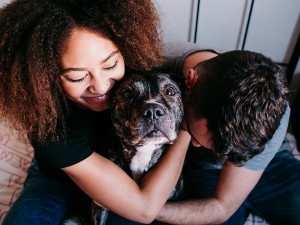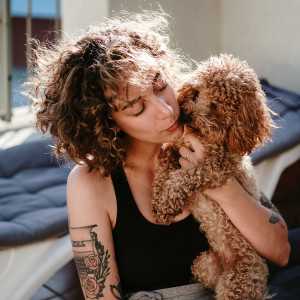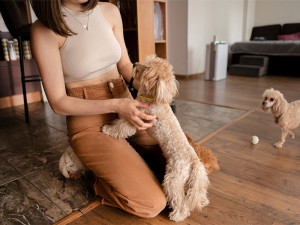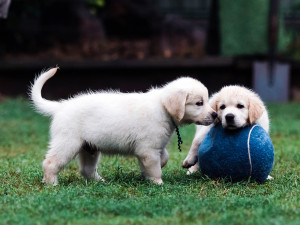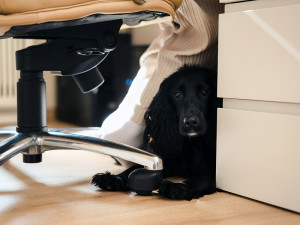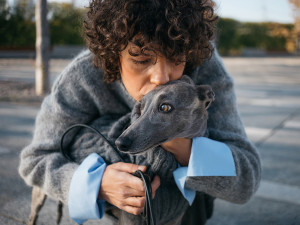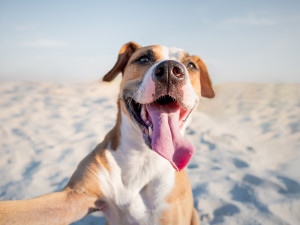Why Does My Dog Stare at Me? Possible Reasons and What to Do
Beyond the fact that they’re your biggest admirer.
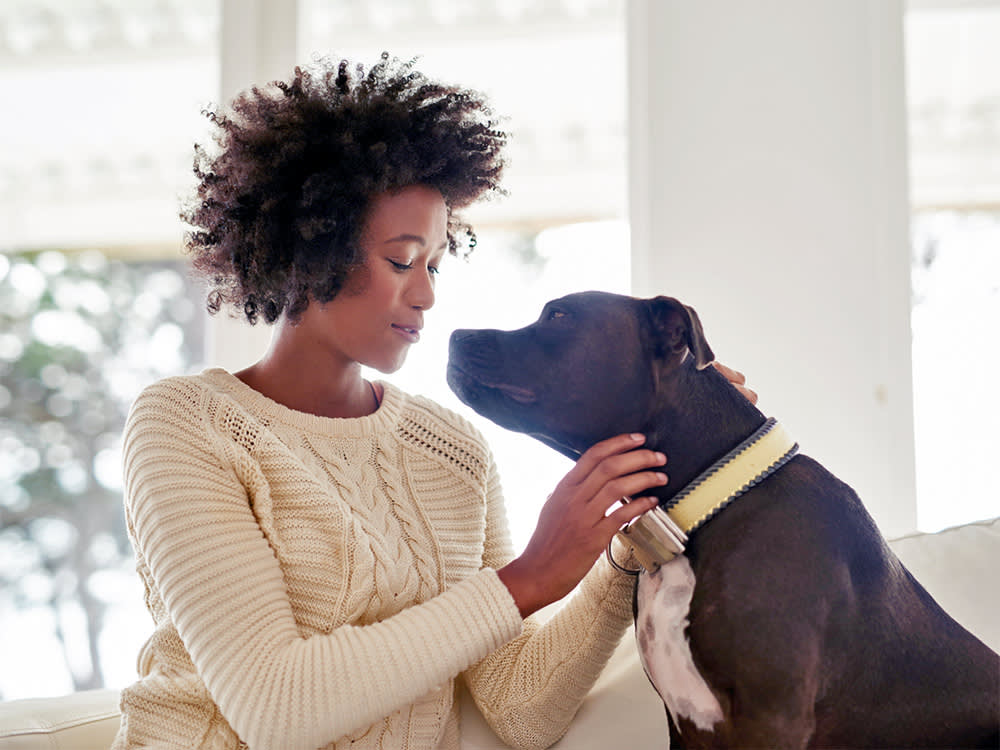
Share Article
In This Article:
Reading Emotional Cues Seeking Your Attention Showing Affection Expressing Confusion or Concern How to Figure Out Why Your Dog Is Staring
While we’d all love to think our dogs are staring at us because we’re just so unbelievably good looking, that’s probably not the case. Your pup’s intense gaze might hold a deeper meaning beyond mere admiration. Dogs communicate primarily through body language and eye contact is a significant part of their social interactions. When your dog locks eyes with you, they might be attempting to convey a message or understand your intentions.
Decoding the various motivations behind your dog’s unwavering stare can provide valuable insight into their behavior and strengthen your bond. From trying to read your emotional cues to simply seeking affection, let’s uncover the potential reasons your dog stares at you and what you can do to turn their attention elsewhere.
Possible reasons for dog staring
Your canine companion’s unyielding gaze may hold deeper meanings than meets the eye. Indeed, dog stares are not merely superficial; they can convey a wide range of emotions and intentions
“Some suggest that dog stares signify affection and adoration towards their pet parents,” says Aaron Rice, dog trainer at Stayyyopens in new tab. “On the other hand, it can also be a polite request for attention, food, or a walk.”
Here are some possible motivations behind your dog’s persistent stare.

Reading emotional cues
Dogs are incredibly attuned to human body language and facial expressions. They may stare at you intently to gauge your mood or emotional state, helping them better understand how to respond or interact with you.
Trying to get your attention
Your dog’s gaze might simply be a polite yet awkward way of asking you to pay attention to them. Whether they’re craving a belly rub, a walk, or just some quality time together, dogs often use eye contact as a subtle way to communicate their desires and needs.
Showing affection
Dogs are pros at expressing love and affection, and one way they do this is through prolonged eye contact. When your canine companion stares at you with those big, soulful eyes, it could simply be their way of telling you they love you.
Expressing confusion or concern
Sometimes a dog’s stare isn’t about seeking attention or showing affection; it’s about expressing confusion or concern. If your dog seems to be staring at you with a furrowed brow or a quizzical expression, they may be trying to make sense of something they find puzzling or worrisome. It could be a new environment, a strange noise, or even your own behavior that has them feeling uneasy.
Attempting to stop an interaction
If you’re approaching your dog and they stare at you intensely, it may mean they don’t want to interact. This will typically also be accompanied by a stiff posture, pulled back ears, and potentially a growl. In this case, it’s important to stop your approach and ensure you’re not making them feel uncomfortable. Continuing forward could result in aggression or other unwanted behavior.
How to figure out why your dog is staring
You’re probably itching to understand exactly why your dog’s eyes are locked on you — because one, maybe they need something, and two, it’s starting to get a little weird. The key to figuring this out lies in understanding dog body language.
“Some pet parents may become concerned when their dog’s staring persists, even when their needs are fulfilled,” Rice says. “In such cases, observing their behavior is essential to figure out the underlying cause. While decoding your dog’s behavior may be challenging, some simple body language cues can tell you a lot.”
First, take note of their overall posture and any accompanying behaviors. For example, if your dog’s body is relaxed, their tail is wagging, and they occasionally glance away from you, it’s likely that they’re seeking attention or affection. On the other hand, if they’re standing stifflyopens in new tab with their ears pinned back and their body tense, they might be feeling anxious or uncertain.
Another important clue to pay attention to is the intensity of your dog’s gaze. A soft, relaxed gaze accompanied by a gentle wag of the tail typically indicates feelings of love and contentment. But if your dog’s stare is intense and unyielding, it could suggest that they’re feeling stressed, threatened, or even on high alert. By observing these subtle cues in your dog’s body language, you can gain a better understanding of their emotional state and the motivation behind their prolonged stare.
Is it normal for my dog to stare at me?
Staring can be a normal behavior in dogs, just like it is in humans (admit it, you do it, too). Most of the time, they’re just doing it to communicate emotions, needs, or desires. But there are also situations where it might indicate an underlying issue. The context and duration of the stare are key in determining whether it’s within the realm of typical behavior or if it warrants taking a closer look.
The point where it could signal something more serious is when your dog’s staring becomes incessant, intense, or accompanied by other concerning behaviors. If your pup’s gaze feels unsettlingly persistent or if they seem to be staring at you with an air of anxiety, aggression, or distress, it’s worth a chat with a veterinarian or animal behaviorist. Any sudden change in your dog’s overall demeanor is worth looking into, staring included.
How can I get my dog to stop staring at me?
As endearing as it may be to have your dog’s undivided attention, there comes a time when you might crave a little space from their intense gaze. But how do you gently nudge your dog to redirect their attention elsewhere? There are a few things you can do:
Distraction with treats or toys: When your dog fixates on you with an intense stare, redirect their attention by offering them a tasty treat or engaging them with their favorite toy. This helps shift their focus away from staring and encourages them to engage in something else.
Use the “look away” command: Teach your dog a cue, such as “look away” or “leave it,” and reward them when they comply by breaking their gaze. Consistently reinforcing this cue helps your dog understand that staring is not the desired behavior.
Provide mental and physical stimulation: Make sure your dog receives enough mental and physical exercise throughout the day to prevent boredom and excessive staring. Interactive toys, puzzle feeders, and regular walks or play sessions can help keep your dog mentally stimulated and less inclined to stare.
Establish boundaries: If your dog’s staring becomes bothersome or intrusive, calmly but firmly communicate your boundaries. Use gentle body language or a verbal cue to signal that staring is not acceptable behavior. Consistency is key to reinforcing these boundaries over time and improving your relationship.
Seek professional guidance: If your dog’s staring persists despite your efforts to redirect their behavior, consider consulting with a professional dog trainer or behaviorist. They can provide personalized guidance and techniques to address the underlying reasons for your dog’s staring and help modify their behavior effectively.
“Getting your dog to stop staring can be tricky, but with time and patience, your pup will learn plenty of other exciting things to focus on besides staring,” Rice says.
FAQs (People also ask):
Why does my dog stare at me without blinking?
Dogs may stare at their pet parents without blinking for various reasons. It could be a sign of affection, an attempt to communicate a need or desire, or simply a display of attention. Additionally, dogs have different blinking patterns than humans, and they may not blink as frequently, especially when focused or observing something intently.
Why does my dog stare at me when I sleep?
Dogs could stay at your while you sleep for multiple reasons. It could be a sign of affection, as they may enjoy watching over their pet parent during moments of vulnerability. It could also indicate a desire for attention, especially if the dog is accustomed to receiving interaction or companionship throughout the day.
Why does my dog stare at me when he poops?
Dogs staring at their pet parents while pooping is a behavior that can stem from their instinctual need for security and protection. In the wild, dogs are vulnerable during elimination, so they may look to their pack leader (in this case, you) for reassurance and protection. Dogs are also highly attuned to human body language and may seek visual cues from their pet parents for comfort or security, even during routine activities like bathroom breaks.
Why does my dog follow me everywhere?
Dogs may follow their pet parents everywhere for a variety of reasons, including seeking companionship, expressing affection, or simply out of curiosity. Dogs are social animals who thrive on human interaction and may feel more secure when they are in close proximity to their humans. Dogs may also follow their pet parents as a way to monitor their activities, seek attention, or explore their environment.
References:
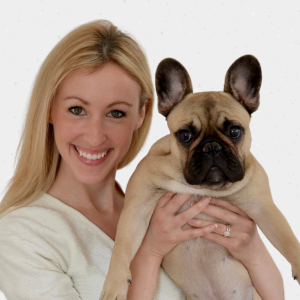
Courtney Elliott
Courtney Elliott, a proud Cleveland native living in Manhattan, blends her decade of writing and editing expertise with her unshakable devotion as a pet parent to her French Bulldog, Gus. When she’s not at her desk, you’ll find her frolicking in Central Park or engrossed in a good book at a local coffee shop.
Related articles
![Two Golden Retriever puppies playing with a large blue tennis ball outside in the grass]()
What to Expect at Puppy Socialization Classes
A dog behaviorist schools us on why puppy classes are more about socializing than getting straight As.
![a puppy sleeping with their eyes open]()
Can Dogs Sleep With Their Eyes Open?
Dogs: They’re not just like us.
Why Do Dogs Lay on Your Feet?
Not that anyone’s complaining...
![Shiba inu dog sleeping in bed]()
My Dog Sleeps All Day—Is That Normal?
Dogs need more sleep than humans. Here’s how much is healthy.
How to Tell If Your Dog Is a Hugger—Or Not
Boundaries, folks. Boundaries.
![Dog in the sand smiling at the camera]()
Can Dogs Smile?
There’s a big difference between a dog smiling and showing their teeth.

